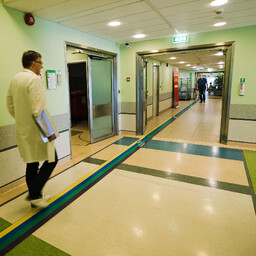Praegu töötab
Eesti tervishoiusüsteemis
umbes 130 logopeedi. Kuid vaja oleks veel rohkem. Kutsekoja uuringu järgi on vaja juurde üle saja logopeedi. Probleem on selles, et
iga aasta lõpetab ülikooli
uusi spetsialiste, aga vaid viies osa neist läheb
tööle tervishoiusüsteemi
. Seetõttu jääb umbes 80 logopeedi puudu.
Eesti tervishoiusüsteemis
Tõlge fraasile: Eesti tervishoiusüsteemis
EN
in the Estonian healthcare system
iga aasta lõpetab ülikooli
Tõlge fraasile: iga aasta lõpetab ülikooli
EN
graduate from university every year
tööle tervishoiusüsteemi
Tõlge fraasile: tööle tervishoiusüsteemi
EN
work in the healthcare system
Enamik logopeede töötab täiskasvanutega. Vähem on neid, kes aitavad lastega. Logopeedid on olulised patsientidele, kellel on
probleeme kõnelemise või neelamisega
. Nad töötavad suurtes haiglates ja mõned ka väiksemates haiglates. Viimase kümne aasta jooksul on logopeedide arv tervishoius kahekordistunud. Kuid töökoormus on samuti suur.
probleeme kõnelemise või neelamisega
Tõlge fraasile: probleeme kõnelemise või neelamisega
EN
problems with speech or swallowing
Marika Padrik Tartu Ülikoolist räägib, et
nõudlus logopeedide järele kasvab
. Inimeste eluiga on pikem, mis toob kaasa rohkem haigusi ja probleeme kõnelemisega. Samuti on rohkem lapsi, kes vajavad abi. Meditsiin areneb ja päästab rohkem väikelapsi elu.
nõudlus logopeedide järele kasvab
Tõlge fraasile: nõudlus logopeedide järele kasvab
EN
demand for speech therapists is growing
Sotsiaalministeeriumi kohaliku tervishoiuteenuste osakonna nõunik Triin Tõnts ütleb, et olukord on keeruline. Ühest küljest on tehtud edusamme: logopeedid on saanud
paremad töötingimused ja palgad
. Kuid teiselt poolt jääb suur osa lõpetajatest tervishoiusüsteemist eemale. Enamik läheb
haridusse või erasektorisse
. Haiglates ja rehabilitatsioonikeskustes on logopeede ikka vähe.
paremad töötingimused ja palgad
Tõlge fraasile: paremad töötingimused ja palgad
EN
better working conditions and salaries
haridusse või erasektorisse
Tõlge fraasile: haridusse või erasektorisse
EN
into education or the private sector
Triin Tõnts räägib, et oluline on mõista, miks noored spetsialistid ei taha tervishoius töötada. Kas töökoormus on liiga suur või palgad liiga madalad? Või ei pakuta neile piisavalt tuge? Tõsiselt tuleb välja selgitada põhjused, et leida lahendusi. Näiteks võib
suurendada õppekohtade arvu
või pakkuda paremaid töötingimusi. Samuti võiks rohkem
kasutada digitehnoloogiaid
, et aidata patsiente, kus füüsiliselt spetsialist puudub.
suurendada õppekohtade arvu
Tõlge fraasile: suurendada õppekohtade arvu
EN
increase the number of study places
kasutada digitehnoloogiaid
Tõlge fraasile: kasutada digitehnoloogiaid
EN
use digital technologies
Currently, about 130 speech therapists work in Estonia's healthcare system. But more are needed. According to a study by the Chamber of Commerce, over a hundred additional speech therapists are required. The problem is that every year, the university graduates new specialists, but only a fifth of them start working in the healthcare system. As a result, there is a shortage of about 80 speech therapists.
Most speech therapists work with adults. Fewer are those who help children. Speech therapists are important for patients who have problems with speech or swallowing. They work in large hospitals and some in smaller hospitals. Over the past ten years, the number of speech therapists in healthcare has doubled. However, the workload is also high.
Marika Padrik from the University of Tartu says that the demand for speech therapists is growing. Life expectancy is longer, which leads to more illnesses and speech problems. There are also more children who need help. Medicine is advancing and saving more young lives.
Triin Tõnts, advisor to the Department of Local Healthcare Services at the Ministry of Social Affairs, says the situation is difficult. On one hand, progress has been made: speech therapists have received better working conditions and salaries. But on the other hand, a large portion of graduates stay away from the healthcare system. Most go into education or the private sector. There are still too few speech therapists in hospitals and rehabilitation centers.
Triin Tõnts says it is important to understand why young specialists do not want to work in healthcare. Is the workload too high or the salaries too low? Or are they not given enough support? It is crucial to seriously identify the reasons to find solutions. For example, the number of study places could be increased or better working conditions could be offered. Digital technologies could also be used more to help patients where a specialist is physically unavailable.

